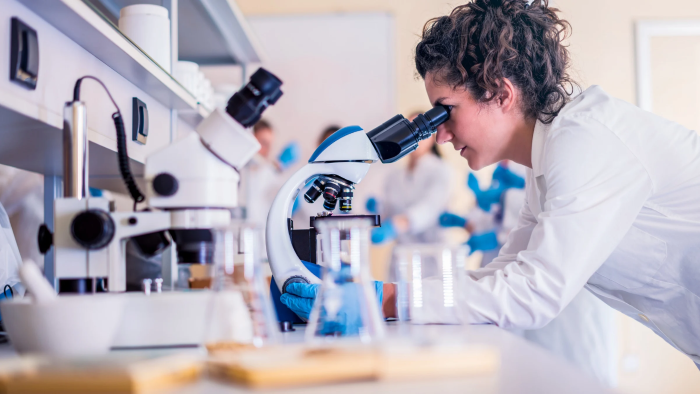Queen’s Life Science
The Queen’s University Life Sciences program is a discipline-based biomedical science degree program in which students learn topics such as anatomical, biochemical, epidemiological, immunological, microbiological, pathological, pharmacological, and physiological sciences.
Students can opt to minor, major or specialize in a Life Science degree program. Students who specialize have the option complete subplans in cardiovascular and respiratory sciences, drug development and human toxicology, cancer biology and genetics, biomedical discovery and neuroscience.
Program by Year
First Year
During first year students take a variety of introductory sciences to lay the foundations for future course work.
In second year students begin focusing on biomedical sciences and continue to build foundational knowledge.
-
Major Students
BIOL 102 Fundamentals of Biology: Molecular and Cell Biology
BIOL 103 Fundamentals of Biology: Organisms to Ecosystems
CHEM 112 General Chemistry
CISC 151 Elements of Computing with Data Analytics
PHYS 115 Introduction to Physics I
MATH 130 Mathematics for Biochemistry and Life Sciences
BCHM 102 Introduction to Biochemistry or PATH 120 Understanding Human Disease in the 21st Century
Specialization Students
Specialzation is not declaired at this time, students will take the same courses as major students. Students may wish to take PSYC 100 Principles of Psychology as it may be a prerequisite for upper year courses.
-
Students may take electives from any faculty in the Faculty of Arts and Sciences.
Common Electives Include:
ANAT 100 Anatomy of the Human Body
GLPH 171 Social and Physical Determinants of Health and Disease
IDIS 173 The History and Philosophy of Health and Healthcare
PHAR 100 Introductory Pharmacology
PHGY 170 Human Cell Physiology
PSYC 100 Principles of Psychology
Second Year
-
Major Students
BCHM 218 Molecular Biology
CHEM 281 General Organic Chemistry I (with Virtual Laboratory)
CHEM 282 General Organic Chemistry II (In-Person Labrtory)
PHGY 215 Principles of Mammalian Physiology l
PHGY 216 Principles of Mammalian Physiology ll
One of the following statistics courses: BIOL 243, STAM 200, STAT 263
One of the following Microbiology courses : MICR 221 Fundamental Microbiology or MICR 271 Introduction to Microbiology
Students are also required to take one 200 level course from List A which can be found in the academic course guide
Specialization Students
BCHM 218 Molecular Biology
CHEM 281 General Organic Chemistry I (with Virtual Laboratory)
CHEM 282 General Organic Chemistry II (In-Person Labrtory)
PHGY 215 Principles of Mammalian Physiology l
PHGY 216 Principles of Mammalian Physiology ll
ANAT 215 Principles of Human Morphology I
ANAT 216 Principles of Human Morphology II
One of the following statistics courses: BIOL 243, STAM 200, STAT 263
One of the following Microbiology courses : MICR 221 Fundamental Microbiology or MICR 271 Introduction to Microbiology
-
IDIS 280 Interprofessional Approaches in Healthcare
BCHM 270 Biochemical Basis of Health and Disease
GLPH 271 Global and Population Health
GLPH 281 Racism and Health in Canada
PHGY 290 Investigation of Human Physiological Responses
Third Year
During third year students are able to begin taking more courses of interest in a variety of biomedical disciplines.
-
Major Students
Students are required to take 5 courses from List A at the 300 level. These can be found in the academic course guide.
Specialzation Students
PHAR 370 Fundamentals of Pharmacology and Therapeutic
Depening on desired sub plan, students will have additional required courses. For more information look at the academic course guide.
-
ANAT 309 Functional Histology
ANAT 380 Clinically Relevant Human Anatomy
CANC 380 Evolutionary Biology of Cancer
GLPH 385 Biohacking & Gerontechnology
IDIS 373 Health Ethics, Law, and Policy
LISC 300 The Process of Discovery in the Biomedical Sciences
LISC 390 Integrated Life Science Laboratory I
NSCI 325 The Science of Psychedelics
PATH 310 Introduction to Pathology and Molecular Medicine
PHGY 350 Pathophysiology
REPD 372 Reproduction and Development
Fourth Year
In fourth year students can focus on specific subjects related to their career goals and complete research projects.
-
Major Students
One course from List A at the 400 level. Options can be found in the academic course guide.
Specialization Students
499 Research Project
Students will have additional requirements depending on their subplan, please see academic requirementsfor these courses.
-
ANAT 471 Human Embryology
BCHM 482 Proteomics and Metabolomics
CANC 440 Cancer Biology and Therapeutics
CRSS 454 Cardiovascular Sciences
GLPH 471 Advanced Global and Population Health
IDIS 480 Advanced Interprofessional Approaches in Healthcare
IDIS 483 Applied Health Ethics: Clinical, Organizational, and Research Perspectives
LISC 400 Neuro-Immune Interactions in Health and Disease
MICR 452 Viral Infection and Immunity
NSCI 429 Disorders of the Nervous System
PATH 430 The Molecular Basis of Disease
PHAR 480 Drug Discovery and Development
PHGY 424 Ion Channels of Excitable Cells
REPD 473 Developmental Origins of Health And Disease






